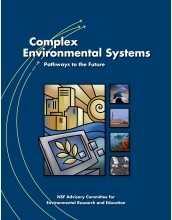Media Advisory 05-005
New Environmental Report Released at Biocomplexity in the Environment Meeting
"Pathways to the Future" Report Highlights Research in Complex Environmental Systems
March 15, 2005
This material is available primarily for archival purposes. Telephone numbers or other contact information may be out of date; please see current contact information at media contacts.
A multiplicity of accelerating environmental changes has presented humanity with some significant scientific and engineering challenges, according to the new National Science Foundation (NSF) report "Pathways to the Future: Complex Environmental Systems, Synthesis for Earth, Life and Society in the 21st Century." The report will be released at next week's meeting of NSF's Biocomplexity in the Environment grantees.
Among the changes cited in the report are rapid shifts in climate and ecosystems; the degradation of freshwater resources; the spreading global reach of diseases; and the increasing threat of biological and chemical terrorism. Among the research challenges are the need to understand how and why these changes are occurring—especially when multiple stresses are acting on environmental systems simultaneously—and how best to respond to them.
"Now more than ever," write the report's authors, the members of the NSF Advisory Committee for Environmental Research and Education, "scientists must address combinations of factors in their research, such as the interactions between human activities and natural cycles at different spatial and temporal scales."
The report encourages NSF to maintain its foundation-wide emphasis on investigations of coupled human and natural systems, as currently embodied in the Biocomplexity in the Environment program, and discusses related goals.
The meeting will feature scientific talks and poster sessions by more than 200 scientists funded by the program, as well as a number of plenary talks. Plenary speakers include Dr. Arden L. Bement, Jr., director of NSF, Dr. Margaret Leinen, assistant director of NSF for geosciences, Dr. David Skole, director of the Center for Global Change and Earth Observations at Michigan State University and chair of the NSF Advisory Committee on Environmental Research and Education, and Dr. Timothy Killeen, director of the National Center for Atmospheric Research in Boulder, Colo.
Who: Dr. Arden L. Bement Jr., director of NSF, Dr. Margaret Leinen, assistant director of NSF for geosciences, Dr. David Skole, chair, NSF Advisory Committee for Environmental Research and Education, plenary speakers
Scientists funded through NSF's Biocomplexity in the Environment program
What: 2005 Meeting of NSF's Biocomplexity in the Environment Awardees
When: Monday, March 21, 2005 - Wednesday, March 23, 2005
Where: Hyatt Regency Crystal City, 2799 Jefferson Davis Highway, Arlington, Virginia 22202
For a detailed symposium agenda, please see: https://www.edjassociates.com/biocomplexity2005/main.asp
-NSF-
Media Contacts
Cheryl L. Dybas, NSF, (703) 292-7734, email: cdybas@nsf.gov
The U.S. National Science Foundation propels the nation forward by advancing fundamental research in all fields of science and engineering. NSF supports research and people by providing facilities, instruments and funding to support their ingenuity and sustain the U.S. as a global leader in research and innovation. With a fiscal year 2023 budget of $9.5 billion, NSF funds reach all 50 states through grants to nearly 2,000 colleges, universities and institutions. Each year, NSF receives more than 40,000 competitive proposals and makes about 11,000 new awards. Those awards include support for cooperative research with industry, Arctic and Antarctic research and operations, and U.S. participation in international scientific efforts.
Connect with us online
NSF website: nsf.gov
NSF News: nsf.gov/news
For News Media: nsf.gov/news/newsroom
Statistics: nsf.gov/statistics/
Awards database: nsf.gov/awardsearch/
Follow us on social
Twitter: twitter.com/NSF
Facebook: facebook.com/US.NSF
Instagram: instagram.com/nsfgov

